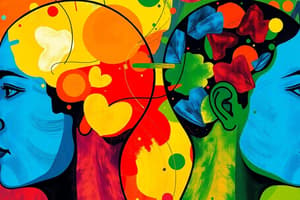Podcast
Questions and Answers
Which factor is primarily associated with the idea that individuals who excel in one type of ability test tend to excel in others?
Which factor is primarily associated with the idea that individuals who excel in one type of ability test tend to excel in others?
What are the two types of intelligence categorized by Vernon?
What are the two types of intelligence categorized by Vernon?
According to Goleman's Theory, what is Emotional Intelligence (EQ) primarily used to predict?
According to Goleman's Theory, what is Emotional Intelligence (EQ) primarily used to predict?
Which of the following components is NOT part of Goleman's theory of Emotional Intelligence?
Which of the following components is NOT part of Goleman's theory of Emotional Intelligence?
Signup and view all the answers
What is the role of differential psychology?
What is the role of differential psychology?
Signup and view all the answers
Which type of intelligence is defined as learned knowledge and strategies used to solve complex problems?
Which type of intelligence is defined as learned knowledge and strategies used to solve complex problems?
Signup and view all the answers
Who is recognized for developing the first intelligence test aimed at establishing intelligence norms by age?
Who is recognized for developing the first intelligence test aimed at establishing intelligence norms by age?
Signup and view all the answers
What distinguishes Fluid Intelligence from Crystallized Intelligence?
What distinguishes Fluid Intelligence from Crystallized Intelligence?
Signup and view all the answers
Which of the following components of personality are described by Freud's theory?
Which of the following components of personality are described by Freud's theory?
Signup and view all the answers
What is the primary focus of Behaviorism as described?
What is the primary focus of Behaviorism as described?
Signup and view all the answers
Which of the following best describes Reciprocal Determinism?
Which of the following best describes Reciprocal Determinism?
Signup and view all the answers
What does the Big Five Trait' Openness/Intellect refer to?
What does the Big Five Trait' Openness/Intellect refer to?
Signup and view all the answers
Which factor includes Agreeableness, Conscientiousness, and Emotional Stability in the hierarchical structure of personality?
Which factor includes Agreeableness, Conscientiousness, and Emotional Stability in the hierarchical structure of personality?
Signup and view all the answers
How much of the variance in the Big Five personality traits is attributed to genetic factors?
How much of the variance in the Big Five personality traits is attributed to genetic factors?
Signup and view all the answers
Which psychometric concept measures whether a test accurately reflects what it claims to measure?
Which psychometric concept measures whether a test accurately reflects what it claims to measure?
Signup and view all the answers
Emotional labor primarily involves what kind of emotional management?
Emotional labor primarily involves what kind of emotional management?
Signup and view all the answers
Which statement is true about personality in the context of job performance?
Which statement is true about personality in the context of job performance?
Signup and view all the answers
What is the significance of Factor Beta in the hierarchical structure of personality?
What is the significance of Factor Beta in the hierarchical structure of personality?
Signup and view all the answers
What does the term 'g Factor' primarily refer to in the context of intelligence?
What does the term 'g Factor' primarily refer to in the context of intelligence?
Signup and view all the answers
Which emotional intelligence component involves understanding and regulating others’ emotions?
Which emotional intelligence component involves understanding and regulating others’ emotions?
Signup and view all the answers
What is the primary distinction between fluid intelligence and crystallized intelligence?
What is the primary distinction between fluid intelligence and crystallized intelligence?
Signup and view all the answers
Which theory emphasizes the potential of Emotional Intelligence (EQ) to predict work behavior?
Which theory emphasizes the potential of Emotional Intelligence (EQ) to predict work behavior?
Signup and view all the answers
In the context of individual differences, intelligence is mainly associated with which of the following?
In the context of individual differences, intelligence is mainly associated with which of the following?
Signup and view all the answers
What is the primary contribution of Alfred Binet to the understanding of intelligence?
What is the primary contribution of Alfred Binet to the understanding of intelligence?
Signup and view all the answers
Which concept best captures informal beliefs about individuals’ traits that guide interactions?
Which concept best captures informal beliefs about individuals’ traits that guide interactions?
Signup and view all the answers
Which area focuses on understanding the reasons behind psychological differences among individuals?
Which area focuses on understanding the reasons behind psychological differences among individuals?
Signup and view all the answers
Which of the following statements about the Big Five personality traits is accurate?
Which of the following statements about the Big Five personality traits is accurate?
Signup and view all the answers
What role does self-efficacy play in Bandura's Social Learning Theory?
What role does self-efficacy play in Bandura's Social Learning Theory?
Signup and view all the answers
In Freud's model of personality, which component is primarily responsible for moral standards and ideals?
In Freud's model of personality, which component is primarily responsible for moral standards and ideals?
Signup and view all the answers
What is the main focus of operant conditioning within the framework of behaviorism?
What is the main focus of operant conditioning within the framework of behaviorism?
Signup and view all the answers
Which of the following best describes the concept of emotional labor?
Which of the following best describes the concept of emotional labor?
Signup and view all the answers
Which dimension is included in Factor Alpha of the hierarchical structure of personality?
Which dimension is included in Factor Alpha of the hierarchical structure of personality?
Signup and view all the answers
What does the term 'reciprocal determinism' refer to in Social Learning Theory?
What does the term 'reciprocal determinism' refer to in Social Learning Theory?
Signup and view all the answers
Which trait is characterized by the degree to which a person is organized and dependable?
Which trait is characterized by the degree to which a person is organized and dependable?
Signup and view all the answers
Which factor comprises Extraversion and Openness in the hierarchical model of personality?
Which factor comprises Extraversion and Openness in the hierarchical model of personality?
Signup and view all the answers
What is a critical aspect of psychometrics in the context of personality assessment?
What is a critical aspect of psychometrics in the context of personality assessment?
Signup and view all the answers
Study Notes
Individual Differences in the Workplace
- Individual differences significantly impact job performance, career success, and interpersonal interactions.
- Key areas of individual differences include intelligence, personality, emotions, and psychometric assessments.
Implicit Theories
- Implicit theories are informal beliefs about individuals' traits.
- These beliefs guide interactions but aren't scientifically based.
- People use their own behavior and observations of others to form implicit theories.
- These theories used to predict how people will react.
Differential Psychology
- Differential psychology studies individual differences in psychology using consistent measurement to predict work outcomes.
Intelligence/Cognitive Ability (GMA)
- GMA involves reasoning, planning, problem-solving, and abstract thinking.
- It's a broader capability for understanding things.
- Francis Galton studied hereditary intelligence and established cognitive ability tests.
- Alfred Binet developed the first intelligence test (Binet-Simon Scale), with norms by age.
- Spearman's "g factor" is a general intelligence underlying various abilities.
- Highly scoring in one ability test often means high scores on others.
- Thurstone's seven primary abilities (verbal comprehension, word fluency, numerical facility, spatial visualization, associative memory, perceptual speed, and reasoning) were proposed to reject the "g factor".
- Vernon grouped intelligence into verbal and spatial/mechanical domains.
- Cattell described crystallized intelligence (gc) as learned knowledge and strategies for problem-solving while fluid intelligence (gf) is problem-solving without prior knowledge.
- The Wechsler-WAIS tests use a hierarchical model with various sub-tests..
Emotional Intelligence (EQ)
- Goleman's theory suggests EQ can better predict work behavior than GMA.
- EQ involves perceiving emotions, accessing feelings for thought, and understanding/regulating others' emotions.
- There's debate whether EQ is an ability or a personality trait.
- The link between EQ and work success is less consistent than intelligence.
Personality Theories
-
Freudian Psychoanalysis: Id, ego, superego drive behavior and personality development through psychosexual stages (oral, anal, phallic, latency, genital).
-
Behaviorism (Watson, Skinner): Focuses on observable behaviors shaped by environment. Ignores internal personality processes.
-
Classical conditioning involves learning through association (Pavlov).
-
Operant conditioning modifies behavior through rewards and punishments (Skinner).
-
Operant conditioning can be used for managing employee performance.
-
Social Learning Theory (Bandura): Personality results from a person's interaction with their social context. Reciprocal determinism suggests an interaction between personal, environmental, and behavioral factors. Observational learning and self-efficacy (belief in ability) play a role.
-
Trait Theory: Personality is defined by internal, consistent, and stable characteristics. Factor analysis simplifies personality to dimensions.
Big Five Model
- Extraversion: Outgoing vs. quiet.
- Agreeableness: Warm vs. unfriendly.
- Conscientiousness: Organized vs. impulsive.
- Emotional Stability: Calm vs. anxious.
- Openness/Intellect: Imaginative vs. unimaginative.
- Stability, heritability, and cultural relevance are noted concerning the Big Five.
Hierarchical Structure of Personality
- Grouping traits (Alpha and Beta) into factors provides more detailed personality insight.
- A ten-dimension taxonomy was created by De Young that expandes on these findings, refining personality structure.
Psychometrics
- Psychometrics measures intangible psychological differences.
- Key concepts include reliability (test stability) and validity (measuring what it claims).
Individual Differences at Work
- Cognitive ability strongly predicts job performance.
- Personality is correlated less consistently, but relevant to job requirements (satisfaction and commitment, organizational citizenship behavior, occupational interests).
- Emotions also predict job performance, impact decision-making, creativity, satisfaction, prosocial behaviors, and absence/leaving a job.
- Emotional labor is masking/managing emotions in customer-facing roles.
Studying That Suits You
Use AI to generate personalized quizzes and flashcards to suit your learning preferences.
Description
Explore the impact of individual differences on workplace performance and relationships. This quiz covers key concepts in differential psychology, intelligence, and implicit theories, examining how these elements affect career success and interpersonal dynamics.




